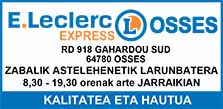Murphy Woodhouse. However, most area residents with Basque surnames interviewed for this story knew little or nothing about how their ancestors arrived in Southern Arizona or Northern Sonora. Some knew small portions of the story.
Rosa Michelena of Nogales, whose late husband Charles Michelena was of Basque descent, said that some of his forebears had lived in the Sonoran mining town of Cananea before moving to Solomon, Ariz., just outside of Safford. Raul Garayzar of Rio Rico said that his father was originally from La Paz, South Baja California, but moved to the United States and raised his family in Santa Cruz County. Garayzar added that his father’s family had been in Mexico for generations.
William Douglass, a Basque scholar who founded the Center for Basque Studies at the University of Nevada-Reno, said the Basques were the “mariners of Iberia,” meaning they played an outsize role in the Spanish conquest of the Americas and exploration into what is now the American Southwest.
“The strong Basque presence down there dates back to the colonial period in Mexico and independence of Mexico,” Douglass said, adding that Basques “were a big part of the whole northward thrust” into the present-day U.S. Southwest from Nueva España, the Spanish colony that included what is now Mexico.
It was an explorer of Basque descent, Juan de Oñate, who colonized what is now New Mexico in the late 16th century on behalf of the Spanish crown and another of similar origin, Juan Bautista de Anza, who set out from the Tubac Presidio in 1774 to San Francisco Bay, Douglass recounted. De Anza would later become governor of New Mexico.
“Basques were active in the Southwest before the Pilgrims in North America,” Douglass said. “Two decades before the Pilgrims arrived and we started on our particular development, there were already Basques in the Southwest.”
“There’s a way in which the Basque presence in Arizona is quite ancient,” he added. “It’s never been huge, but it’s ancient.”
Name debate
Perhaps one of the biggest contributions the Basques made to the state of Arizona was its name, though significant controversy still surrounds the matter. In a 1979 article in the academic journal Names, Douglass makes the argument that the state’s name derives from the Basque word for “the good oak tree.”
Douglass noted that an old mining site 20 to 30 miles southwest of Nogales was called Arizona. “(T)hat’s about where the tall white oaks kick in versus the scrub oak coming up from the coast,” he said, adding that Basque miners at the location in Northwestern Sonora might have used those sturdier trees for construction.
The late local historian Don Garate, a Basque descendant who served as the chief interpreter at Tumacacori National Historical Park, took up Douglass’ argument and defended it in several articles with a number of colonial documents from the early 18th century.
Other theories attribute the state’s name to the O’odham phrase meaning “place of the small spring,” though state historian Marshall Trimble has said he favors the Basque explanation.
Later Basque migration to the area in the late 19th and early 20th century came mostly in the form of California Basque sheepherders pushing out of the coastal state into a number of other Western states, Douglass said. Idaho was among the most popular destinations, though Arizona received some of the migrant shepherds as well.
Others, like the founders of the Arizona mine, were drawn to the rich mineral resources of the Arizona-Sonora borderlands.
Local contributors
In recent decades, Santa Cruz County residents of Basque ancestry have been prominent members of the local community. For example, the Teyechea family, whose name comes from the Basque surname Teietxea, includes former Sheriff Jaime Teyechea, former city council member Ben Teyechea, after whom Teyechea Park was named, and Jaime’s son Jimmy Teyechea who founded the advocacy organization Life is for Everyone after he was diagnosed with a rare bone-marrow cancer.
In the obituary that ran in the Nogales International for Jimmy in 1994, the author wrote, “His heart like his Basque ancestors was set on one thing, namely, to endure.”



 Lagun bati bidali
Lagun bati bidali Komentarioa gehitu
Komentarioa gehitu








